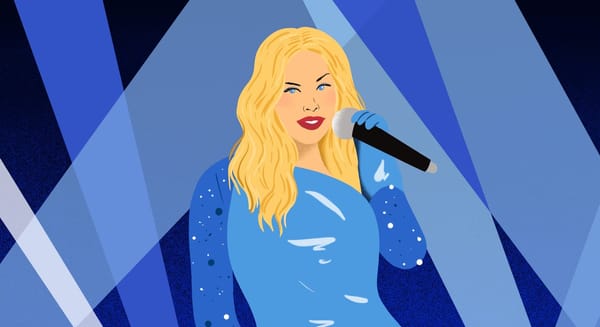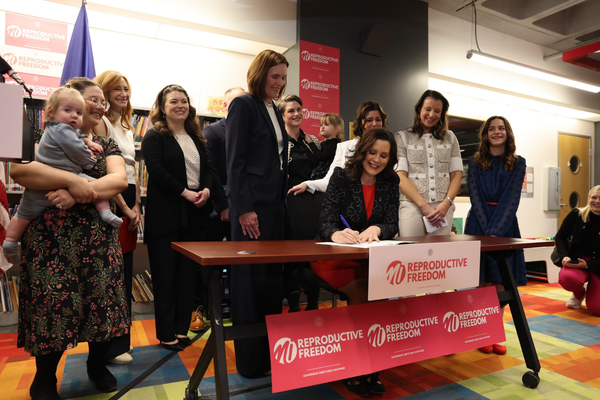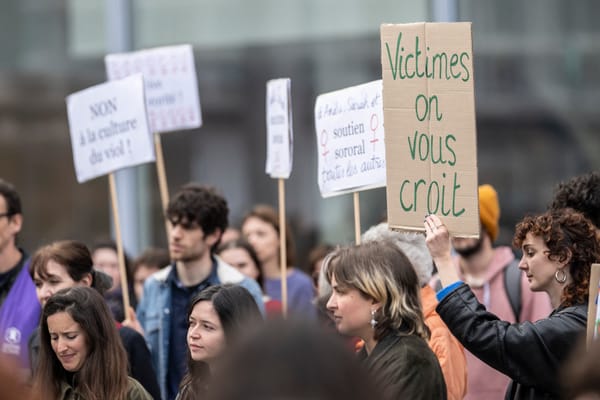Who Gets to be a Wartime Hero?
Overlooked stories of women are everywhere. Sometimes you just need to find them.

Almost everyone is familiar with her: Hair tied up in a red and white polka-dot bandana, blue collared shirt, rouged cheeks, pink lips, a look of fierce resolve and, of course, that firm bicep angled just so—Rosie the Riveter, tough as nails, against a banana-yellow backdrop. America’s World War II darling.
Rosie’s message was clear: that women could roll up their sleeves and do the tough work just as well as men. She’s a powerful reminder that wartime victories bear women’s names too. Even today, decades on from when she first appeared, Rosie the Riveter (and her many variations) remains a feminist icon.
There’s just one problem.
Rosie the Riveter is overwhelmingly represented as white. But we know that women of color played just as critical a role in World War II, working in factories, shops and other places. So where are they? Sometimes all you need to do is look.
Late last year, the movie ‘The Six Triple Eight,’ directed by Tyler Perry, told the overlooked story of the 6888th Central Postal Directory Battalion, an all-women-of-color unit in World War II, that was tasked with clearing an enormous backlog of undelivered mail sent between soldiers on the front lines and their loved ones back home.
In a quest to ensure critical supplies reached those fighting, the task of delivering mail had fallen by the wayside, causing letters and packages to pile up.
But it gradually became apparent that being in communication with families and friends was actually a critical way of sustaining morale—and therefore of ensuring that those serving their country had the energy to keep going.
When President Franklin Roosevelt—aided by Eleanor Roosevelt and Mary Jane McLeod Bethune, the founder of the National Council of Negro Women—recognized this, he ordered the deployment of the 6888. Its captain, Charity Adams, was the first African-American woman to become an officer in the Women's Army Auxiliary Corps.
The women of the 6888, working in squalid, freezing conditions, sorted some 17 million pieces of mail in just 90 days. Yet, when the war ended, their achievements were hardly celebrated at all. Far from being regarded as war heroes, many of the women just returned to their lives as homemakers, carers and wives—their names vanishing into near-obscurity. Anyone who’s watched the movie will understand the injustice of this. The 6888 not only fought tirelessly for their country, but they did so while simultaneously overcoming sexism and racism.
The actor Ebony Obsidian, who plays Lena Derriecott King, a member of the battalion, talked to The Persistent about her journey to the 6888, what the role taught her, and her hopes for change in the movie industry.
Growing up, you never really envisioned becoming an actor. In fact, you initially studied journalism. What changed?
When I was a child, I never even knew that acting was a job. But the truth is that I was always acting. As a very young child, I would bother my family and friends by reciting lines from films. I would jump from one character to the other in the scene and play out the whole thing. But I never knew that that was acting—I just enjoyed stepping into someone else's shoes.
It wasn't until I was about 13 or 14 that I really consciously wanted to get out there. My mother—who passed away in 2023—was always so supportive. She didn’t share this with me at the time, but she herself had wanted to be an actress, too.
I ended up finishing high school early. I was 17 and I was trying to figure out what to do next. I thought I might want to pursue journalism. But I quickly realized that what I was really in love with was storytelling, and that I wanted to be a part of conversations in which I could bring people's stories to life.
I’m so curious about human beings and why we do what we do. Acting gives you the chance to explore that, but without judgement. I’ve done plenty of things on camera that I do not agree with, but it’s fantastic to have the opportunity to find out why someone would do something when you otherwise wouldn’t. I definitely think I'm a better person because I'm an actor.
How did you prepare for the role of Lena Derriecott King in “The Six Triple Eight?” Tell me about her.
I’d always wanted to play someone who was a real person. And so when this opportunity came along I was like, ‘wait, whoa, this is exciting.’
Playing Lena did feel like a big leap into that challenge—into playing someone who’s real, who’s actually alive. [Editor’s note: Lena Derriecott King died in January 2024 aged 100.] But I was so taken by her character, by her youth and by her innocence. There was also something really relatable to me about how normal she was.
I was taking care of my mom, and I was also playing a woman who, by that point, was almost 100 years old and who had lived through so much. It felt so relevant for that moment in my life.
And there was something that felt serendipitous about it all. I was taking care of my mom, and I was also playing a woman who, by that point, was almost 100 years old and who had lived through so much. It felt so relevant for that moment in my life.
I watched all the footage of her that I could find. I listened to her speaking. The voice is always where I start with the character: What they sound like is really important to me.
One thing I took away from listening to those recordings was how proud she was of her battalion. That pride was very deep and at just 17, she was so young during the war.
I finally got to meet Lena in January 2022, and she really was so incredibly bright; she had such levity. I didn't expect for someone who lived through so much—who lived through World War II and who outlived both of her husbands and both of her children—to be filled with so much brightness. It vibrated around her. She'd done it all and figured it all out. She’d cracked the code.
I often found myself just wanting to soak all of her up, because it’s not often you get to sit with the person who you're playing on screen.
The levity and resilience you saw in her—did that inspire you on a personal level as well?
I really can’t express how much Lena Derriecott King personally affected me—and in a very positive way.
Resistance is something that I think Black women in general are very familiar with. I come from a line of women who have had to be resistant in ways that I can only imagine. My mother was a part of the Civil War. My grandmother was too, and so were all my aunts and uncles. They fled a civil war.
I come from a line of women who have had to be resistant in ways that I can only imagine.
You really learn about resilience when you open yourself up to learning about another person’s experience. And when I learned about Lena’s experience it gave me so much perspective and strength.
Lena also got a chance to see ‘The Six Triple Eight’ before she passed, and I was told she saluted the screen as she watched. Knowing that is beyond special for me.
Recent research shows the percentage of girls and women protagonists in major movies has hit an all-time high. Still, the proportion of women of color protagonists is still relatively tiny. Are you hopeful that the movie industry is moving in the right direction in terms of diversity, even if progress is glacial?
I am very hopeful. That’s largely because I’ve had the opportunity to work with so many people of color behind the camera who have created the stories that I've been a part of.
When you see the work that they're doing and how much work it takes to even get that work to be seen, you realize it's an uphill battle. But that battle is happening and there are absolutely some wins.
Sometimes what sells in this industry is the thing that everyone expects. But my hope is that the things that continue to make it to everyone's living rooms or theaters are the things that push the narrative forward and that expand it in a lot of ways. So yes, I’m hopeful.
What’s next for you?
I’m really excited about a lot of things and I’m doing a lot more writing too. My love for storytelling did, after all, start with writing and everything else followed from there.
You’re an ambassador for the International Rescue Committee and in 2023 you travelled to South Sudan in that capacity. What inspires you to do that work?
As an actress, you play other people and that's a wonderful thing. But the work that I'm doing with the IRC is allowing me to learn about myself.
It’s helping me to connect with my heritage. I'm a first-generation American and there are so many parts of my own heritage that I am not yet connected to.
Our heritage can get lost in translation. Some of it gets lost in the education system, or lost in the community, or the neighborhood that you live in.
Our heritage can get lost in translation. Some of it gets lost in the education system, or lost in the community, or the neighborhood that you live in. All of this can lead us to not being as rooted in our identity. Heritage is, of course, not the only thing that makes up identity, but it's a very big part of who we are.
I come from a culture in which it doesn't matter how American I am, our household will always be very East African. You respect those who have come before you and you respect all that they have sacrificed to get you where you are today.





